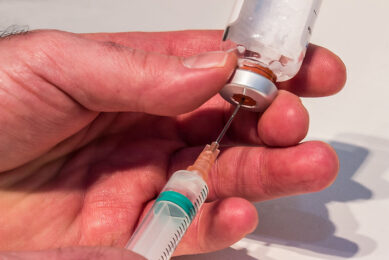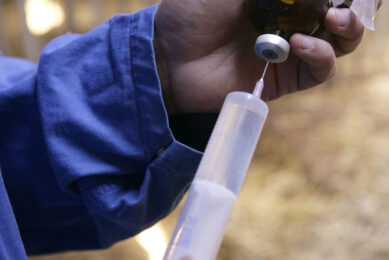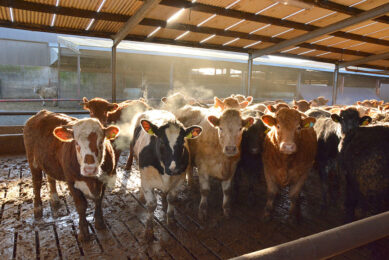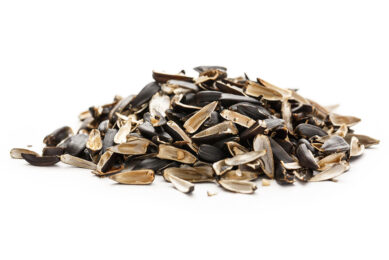Golden Bell extract boosts health of piglets

A recently published paper confirms Golden Bell extract improves health of piglets, with extra benefits to the reproductive performance of the sow.
Golden Bell (Forsythia suspensa) extract is a kind of medicinal herb consisting of 4 main bioactive compounds (forsythiaside A, forythialan A, phillyrin and phillygenin) which have been reported in early studies to improve the antioxidant, microbiota composition, anti-inflammatory functions, and anti-allergic responses in both weaned piglets and broilers. The current research found interest in evaluating whether the extract can have health benefits to the piglet through maternal transmission.
The research
A total of 40 sows (Yorkshire × Landrace) of average parity 3.28 were used to evaluate the effects of dietary Golden Bell extract supplementation during late gestation on colostrum quality, antioxidant status, and immune status in new-born piglets. The benefits of the extract to the sow’s reproductive performance and nutrient digestibility were also explained. From day 85 of gestation up to farrowing, sows were fed one of 2 lactation diets:
- the control diet, and
- the extract diet (control diet + 100 mg/kg Golden Bell extract).
Colostrum quality
Growth performance and health condition of newborn piglets mainly depend on the quality and quantity of colostrum and milk from the sow. Passive immunisation of maternal antibodies through colostrum is pivotal to the success of subsequent active immunisation in the piglet. In this study, researchers ascribed the improved litter performance and decreased mortality rate to higher levels of colostrum immunoglobulin A, G and M observed with supplementation of the extract. They also found increased contents of fat (38 % higher) and protein (33% higher) in colostrum in the extract diet compared to the control diet. They remarked that these increases could provide newborn piglets with extra energy and protein for growth. The serum urea nitrogen concentration (an indicator of protein metabolism) in both piglets and sows was lower in the extract diet, reflecting the increased utilisation of nitrogen in sows and piglets. The content of urea in colostrum was lower in the extract diet compared to control.
Nutrient digestibility
The quality of colostrum and the growth of newborn piglets largely depends on the utilisation of nutrients by the sow. In the current study, supplementation of the extract increased the total tract digestibility of protein and gross energy in the gestating sow (protein: 80 vs 85%; energy: 79 vs 83%, respectively). This improved digestibility was attributed to the potential of the extract to improve the small intestinal villus morphology and permeability as well as the proliferation of peripheral blood lymphocytes, which in turn increase the absorption of nutrients. “The increased CP and GE might help explain the increased contents of fat, protein, glucose and IgA in colostrum, which in turn supplied enough energy and protein to newborn piglets and improved their performance in the current study,” they remarked.
Improved antioxidant status
Research shows that during gestation and lactation, sows may experience oxidative stress leading to the inactivation of antioxidant enzymes. Oxidative stress has been reported to have a role in the development of inflammation that cause negative effects on intestinal integrity and epithelial function. The researchers found that the extract improves the oxidative and antioxidant systems in both the sow and newborn piglet, as was seen with the increased antioxidant enzyme activities of catalase, superoxide dismutase, and glutathione peroxidase in serum and colostrum.
In addition, the colostrum malondialdehyde (a marker for oxidative stress) content was lower in the extract diet. “The protective effect of Golden Bell extract against oxidative stress in the current study might be due to the ability of the antioxidant bioactive compounds (forsythoside A, forythialan A and phillygenin) to up-regulate the antioxidant enzymes. This finding may indicate that the maternal antioxidant capacity transfer can aid in oxidative stress recovery for newborn piglets,” they said. On the other hand, supplementing the extract to sows resulted in decreased amounts of pro-inflammatory cytokines (TNF-α, IL-1β and IL-6), and an increase in the content of anti-inflammatory cytokine (IL-10), in colostrum and in blood serum of piglets and sows.
Better immunity
As what the researchers expected, the Golden Bell extract enhanced the immune function of piglets by improving the level of immunoglobulin in the sow colostrum and serum of piglets. “The greater content of IgA in the colostrum of sows fed the extract diet indicates that the Golden Bell extract improves the passive immunity in piglets. Adding to that, the increased IgA content might help to guard mucosal surfaces from detrimental environmental organisms, which could in turn help the host’s defence against heavy loads of intestinal commensal microorganisms,” they said. As mentioned earlier, supplementing the extract to sows resulted in a decrease in pro-inflammatory cytokines (TNF-α, IL-1β and IL-6), and an increase in anti-inflammatory cytokine (IL-10), in colostrum and in blood serum of piglets and sows. The researchers commented that a greater content of IL-10 demonstrates a reduction in the inflammatory response and enhancement of the humoral immune response, which positively affect the immunity of piglets.
Reproductive performance
Maintaining optimal sow reproductive performance and litter performance is essential in pig production. Treatment with exogenous gonadotropins in sows after weaning or in gilts has been used to stimulate follicular development leading to more piglets born and higher birth weights. In the current study, the extract increased the content of gonadotropin-releasing hormone (GnRH) in the serum of sows and piglets, as well as in colostrum. The researchers stated that besides the observed improvement in sow reproductive performance (higher liveborn and birth weight, and low stillbirth rate), GnRH have positive effects on IGF-1 (insulin-like growth factor 1) which promotes growth.
Conclusion
The researchers concluded that the Golden Bell extract is a beneficial ingredient to kick-start the life of the piglet, while promoting the performance of the sow. Their conclusions on the benefits of the extract supplemented to sows during late gestation can be put as follows:
- Improved colostrum composition (fat and protein content, Immunoglobulin, urea)
- Enhanced digestibility of protein and energy
- Improved antioxidant status and immune function in sows and piglets
- Improved sow reproductive performance
Based on the research paper ’ Dietary supplementation with Forsythia suspensa extract during late gestation improves reproductive performance, colostrum composition, antioxidant status, immunoglobulin, and inflammatory cytokines in sows and newborn piglets’ written by S.F.Long, D.Wu, T.F.He, X.S.Piao and published in
Animal Feed Science and Technology
Vol 271.
 Beheer
Beheer





 WP Admin
WP Admin  Bewerk bericht
Bewerk bericht